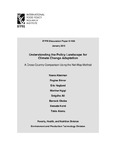Understanding the Policy Landscape for Climate Change Adaptation: A Cross-Country Comparison Using the Net-Map Method
| dc.contributor.author | Aberman, Noora | |
| dc.contributor.author | Birner, Regina | |
| dc.contributor.author | Haglund, Eric | |
| dc.contributor.author | Ngigi, Marther | |
| dc.contributor.author | Ali, Snigdha | |
| dc.contributor.author | Okoba, Barrack | |
| dc.contributor.author | Koné, Daouda | |
| dc.contributor.author | Alemu, Tekie | |
| dc.date.accessioned | 2019-04-01T08:01:16Z | |
| dc.date.available | 2019-04-01T08:01:16Z | |
| dc.date.issued | 2015 | |
| dc.identifier.uri | http://ir.mksu.ac.ke/handle/123456780/4187 | |
| dc.description.abstract | In the context of increasing vulnerability to climate change for people dependent on natural resources for their livelihoods, the International Food Policy Research Institute and partner organizations in Ethiopia, Kenya, Mali, and Bangladesh undertook a project broadly aiming to create knowledge that will help policymakers and development agencies to strengthen the capacity of male and female smallholder farmers and livestock keepers to manage climate-related risks. This study—one component of the project—examines the networks and power dynamics of stakeholders in the four target countries so as to (1) identify potential partners in the research process, (2) find out which organizations could make use of the research findings in their activities, and (3) inform the communication and outreach strategy of the research project. This paper describes the network structures for climate change policy, the actors in the networks with high centrality and influence scores, and the implications of these results for outreach and dissemination. | en_US |
| dc.language.iso | en_US | en_US |
| dc.subject | Climate change adaptation | en_US |
| dc.subject | Policy impact | en_US |
| dc.subject | Stakeholder mapping | en_US |
| dc.subject | Social network analysis | en_US |
| dc.title | Understanding the Policy Landscape for Climate Change Adaptation: A Cross-Country Comparison Using the Net-Map Method | en_US |
| dc.type | Article | en_US |
Files in this item
This item appears in the following Collection(s)
-
School of Agricultural Sciences [118]
Sholary Articles by Faculty & Students in School of Agricultural Sciences

